- Home
- Madeleine L'engle
Camilla Page 14
Camilla Read online
Page 14
When Luisa and I finished our homework we put our books under our arms and began to wander about looking with half an eye at pictures, statues, urns, beads. When I was little I used to pretend that the museum was a great enormous palace and I was a princess who lived there. I liked best the more deserted rooms, where I could really feel I was just wandering around my home and the guards were my footmen instead of enemies. The museum is a wonderful place to dream. In the rooms with the statues there is a whiteness to the light like the whiteness that comes from freshly fallen snow, only somehow it is snow in a dream and not snow as it is on the street and in the park. And the statues and busts are like something out of a dream, staring and staring at you with their milky, blind eyes.
Luisa stopped in front of a modernistic woman, done in sleek angular black. “What are you doing Saturday, Camilla?” she asked.
“I’m going out with Frank.”
“Did he ask you?”
“Of course.”
“When?”
“He telephoned me.”
“Oh,” Luisa said. Her face grew dark and angry; but all she said was, “I suppose it’s your right if you want to.”
“Yes,” I said. “It is.” Then again I tried to explain, looking hard at the bas-relief of a Grecian horse. “Luisa, if only you wouldn’t get mad when I see Frank—it doesn’t make anything different with us because I see Frank. You never mind if I spend the afternoon with one of the other girls from school or if they ask me out to supper—”
“I don’t mind if you see Frank,” Luisa said.
“Then why do you get mad?”
“I don’t get mad,” Luisa said.
I turned away because it seemed to me that there wasn’t anything else to say. But Luisa came over to me and touched me softly on the shoulder.
“Camilla—”
“What?”
“Do you remember, long ago, just after we’d first met, and I told you I didn’t believe in God, and you were so shocked?”
“Yes.”
“And you made me promise to say my prayers at night?”
“Yes.”
“Well, I still do it.”
“Do you, Luisa? Do you really?”
“Yes. Only it doesn’t do any good. When it’s a starry night I look up at the stars the way you told me to and try to feel God, but I never do.”
“There aren’t enough stars in the city,” I told her. “You can’t see enough stars to get the feeling I meant. They have to be country stars, a whole sky full of them. Then you’d feel what I mean.”
“When we went to Fire Island for a week last summer there were plenty of stars then,” Luisa said. “And I didn’t feel what you meant. I’d like to believe in God, Camilla, but I can’t quite seem to.”
“Then why do you go on praying?” I asked.
Luisa shook her head unhappily. “It’s sort of come to be a superstition with me, I guess. I keep thinking that maybe if there is a God, in spite of everything I ought to keep on praying just in case. I figure it can’t do any harm and maybe there’s a wild chance it might do some good. But if there is a God he hasn’t answered any of my prayers. I pray the same thing every night. It’s not like prayers with wishes, I guess. You aren’t supposed to tell a wish, but I guess it’s all right to tell a prayer. I pray that things will be all right with Mona and Bill, and I pray that I may be just a little pretty.” Then she laughed. “Oh, well, laugh, drink, and be merry. As long as you can laugh at it you’re all right. Toujours gai,toujours gai, that’s me.” And we started up one of the back staircases hung with huge, dim pictures.
Then Luisa stopped at the curve of the stair and turned on me with the eagerness with which she always starts a new train of thought. “Listen, Camilla, when did you first learn about the per—the perfidy—of adults?” She grinned. “Good word, isn’t it?”
“I’m not sure I know what you mean,” I said with caution.
“Oh, you know.” Luisa shook her head impatiently and continued up the stairs and on into a room hung with enormous paintings by Whistler and Sargent and Homer and people like that. “About adults not being omnipotent. About them not being perfect. About them being like that Bible quote Mona’s always throwing about. What is it? Oh, yes. ‘The heart is deceitful above all things, and desperately wicked.’ Well, that’s not exactly what I mean. But when were you first betrayed by an adult? Do you remember?”
“Yes,” I said.
“Of course, you’re such a dope about adults; you don’t even realize they’re nothing but people. I wondered if you’d remember anything.”
“I remember,” I said.
“Well, go on. When was it? Where was it?” She sat down on a round bench in the center of the room and pulled me down beside her.
“It was at school,” I said. “It must have been around second or third grade because it was a school that only went to third grade.”
“Well, go on,” Luisa said. “Who was it? What happened?”
I began to feel rather embarrassed, but I knew that Luisa wouldn’t let me get this far without finishing.
Mother had come for me that day instead of Binny. She was late, as usual. She rushed at me where I was sitting waiting for her in the coatroom and gave me a kiss and a hug. “I’m sorry I’m late, sweetheart, I— Get your coat and let’s hurry.” Then, “Camilla, what’s the matter with you?”
I bowed my head in shame. “I’m wet,” I whispered. “Mother, I wet my pants.”
“How did that happen?”
“It was in geography. I had to go to the bathroom and I asked to be excused.”
“But, darling, what happened, why—”
“Miss Mercer said I couldn’t go. And I had to go awful bad so I asked her again and she said no. And I really had to go, Mother, it wasn’t just to get out of class. So I asked her again and she got awfully mad. And I had to go, Mother, I had to, so finally I just got up and ran and I got as far as the bathroom door and then I just went, I just couldn’t wait any longer. And then the bell rang and it was time for French and I went back to the classroom.”
“All right, darling. Don’t worry about it,” Mother said.
“But I’m too big to wet my pants,” I grieved.
“You wait here just a minute longer, sweetheart. No, you’d better come with me.” She took me by the hand and we almost ran to the principal’s office. Mother told her what had happened.
“But I can’t believe it!” the principal exclaimed.
“I assure you it’s true,” Mother said.
The principal rang a bell. “I believe Miss Mercer’s still here. We’d better send for her and clear the matter up.”
Miss Mercer listened with her face like a codfish’s while Mother told her my story. Then she said briskly, “What nonsense. She never asked to be excused.”
The principal nodded. “You see.”
My mother was beginning to get excited. “No, I’m afraid I don’t see. Camilla’s in the habit of telling the truth and if she says she asked to be excused, then she did.”
“Well,” Miss Mercer said, “I’m sure I would have let her go if only she’d asked me. Of course a number of children have been using the bathroom as an excuse to leave class, but if a child really has to leave I’m sure I wouldn’t keep her. Camilla’s probably ashamed of wetting her pants, a big girl like that, and just made up a story to tell you. Her English teacher says she’s very imaginative.”
“But her imagination does not run to lies and she’s no coward,” my mother said, her voice like a furious echo of my father’s.
Then the principal turned to me. “Camilla, did you have to leave the room during geography?”
I nodded.
“Why didn’t you ask Miss Mercer if you could leave?”
“But I did!” I cried. “I asked her three times.”
Miss Mercer shrugged. “You see?”
“Camilla,” the principal went on, “surely you know Miss Mercer would have let you leave if you ha
d raised your hand?”
“But I did,” I cried again, “and she didn’t.”
The principal turned to my mother. “What am I to do?” She sounded amused, as though children were just odd little creatures who could never be trusted.
My mother looked at her. “Nothing. When it comes to choosing between the word of a teacher and the word of a child I suppose you have to take the teacher’s word even if you know the child is telling the truth.”
“Really!” Miss Mercer exclaimed.
“It’s splendid of you to believe in your little girl so unreservedly,” the principal said, “but in this case I’m sure it was because she was ashamed at having wet her pants that she told you what she did. Isn’t that so, Camilla?”
“No,” I said.
My mother bowed to the principal and Miss Mercer. “We’re arguing in circles. I think I’d better get Camilla home and into dry clothes. And I trust that the next time she asks to be excused she will be excused.” And she took me home and gave me a bath and put dry clothes on me and spent all afternoon playing with me, though she was supposed to go somewhere for tea. Then when my father came home they went into his study and talked and talked. And then Father came into my room and took me into the study and sat down and I sat on his lap.
“Camilla,” he said, “your mother tells me you had a diffi-cult experience today at school.”
“Yes, Father.”
“Are you sure you aren’t making a mistake when you say that Miss Mercer wouldn’t excuse you?”
I knew that I wasn’t making a mistake. “Mother believed me!” I cried. “Doesn’t she still believe me?”
“She knows you would never tell a lie intentionally,” my father said, and I was almost distracted because it seemed to me that now my father and mother believed in Miss Mercer and not in me, and if nobody believed in me, if nobody believed the truth, then something horrible had happened to the truth. But then my father looked at me and said, as though he had suddenly come to a decision, “Your mother believes you and I believe you, and I want you to know that we will never doubt your word under any circumstances whatsoever.”
Then I put my head down against him and cried and he rocked me very gently in his arms. Then I asked him. “Father—”
“Yes, Camilla?”
“Miss Mercer told a lie, then.”
“Yes, Camilla.”
“But she’s grown-up.”
“Yes.”
“I didn’t know grown-ups ever told lies.”
“Grown-ups aren’t so very different from children,” he told me. “Some are nice and some aren’t. Remember that little girl you met at a party who cheated at all the games?”
“Yes, Father.”
“And none of the rest of you liked her because of it?”
“No.”
“But you like most of the other children, don’t you?”
“Yes, Father.”
“Well, it’s the same way with adults, darling. Some are very wonderful people and others aren’t nice at all. And remember that the principal of your school was in a very diffi-cult position. Only a very fine woman would have realized that she was doing a great wrong in not recognizing the truth; and evidently your principal is not a very fine woman. And another thing to remember, Camilla. Sometimes you can learn a lot from people who really aren’t very nice. So don’t forget that Miss Mercer still has a lot to teach you about geography—and you’ve got a lot to learn about it.”
I sat there on his lap in silence for a while, then I asked, “Father—you do believe I was telling the truth about asking to be excused?”
“Yes, Camilla. I know you were telling the truth.”
I held him very closely then. “Oh, Father,” I whispered, “I do love you so.”
I sat there on the round bench beside Luisa and stared up at the portrait of three beautiful ladies in white dresses and thought how much I had loved him and I wanted to cry again now as I had cried then; I had to bite my teeth against my lip to keep from crying right there in the museum with people wandering around looking at the pictures.
“What I don’t understand,” Luisa said, “is why it is necessary for adults to be the way they are. What a stinking business, Camilla. What a stinking lousy thing for an adult to do to a kid. I don’t understand how one could.”
“No. I don’t understand it either.” I looked into Luisa’s blue eyes, dark with intensity, and I felt very warm toward her because she had not laughed at what I told her, because, though she had not said a great deal, I knew she had understood.
“Listen,” she said, “did Frank ever tell you about why he was expelled?”
“Yes.” I nodded.
“There you are again. The guy who ran that school ought to have been drawn and quartered. Sure, I think Frank goes overboard about things like that, but when someone you’ve known the way Frank knew Johnny dies in your arms you oughtn’t to be supposed to make sense. I thought Mona’d raise a stink when Frank got kicked out, and she did give him heck, but then she went up and gave the headmaster such a talking to I bet his ear still burns. Listen, Camilla, about Frank.”
“What about him?”
“Well—has he ever tried to kiss you or anything?”
I was surprised and I was angry. I was really angry. We had been so close and warm, and now all that warmth was pushed away. “No. Why should he?”
“Frank likes girls and you’re pretty. Frank matured very young for a boy. It’d have been much more in character if he’d been kicked out for carrying on with some girl than for religious what-you-may-call-it.”
“Whatever made you think of such an idiotic question!” I asked, almost shouting the words at her, and a lady in a mink coat turned around and said, “Girls! Shhh!”
“Well, I thought you might like it if he did kiss you,” Luisa said, lowering her voice. “Have you ever been kissed, Camilla?”
“No,” I said. I was angrier than I have ever been angry with Luisa.
“Would it surprise you if I said I had? Been kissed, I mean?”
“Not particularly.” I was still very angry.
“Well, I have. Even if it seems funny, ugly old Luisa’s been kissed.”
“It doesn’t seem funny.”
“Believe me, Camilla,” Luisa said, “it’s an awful letdown when it happens. It isn’t a bit the way it is in the movies. I expected I’d just about swoon but I didn’t even particularly like it. Maybe it’s because I wasn’t in love. It was this slob who took me out one night during last Easter holidays. His mother works on the magazine with Mona and I guess they thought it would be just too cute to get the kids together. He goes to some swanky boarding school and he thought he was a lot smoother than he was. Anyhow, his hair smelled so of brilliantine it almost made me sick. We went to the theater— a stinking musical when I wanted to see an honest-to-goodness play—and all the time he kept holding my hand and his hand was wet and clammy. The only reason I played along with him was for experimental purposes. I mean, a girl who’s going to be a doctor ought to know about everything, and I wanted to know what it was really like, going on a date and necking with a boy, if you can call holding hands in the fifth row orchestra necking. Anyhow, he took me out afterward for a sandwich and ginger ale at Sardi’s. Then he took me home in a taxi and I’d got to the point where I was so used to subways and buses I’d forgotten what riding in a taxi was like. He held my hand in the taxi and then he kissed me. It was all slobbery and wet and I wiped my mouth on my handkerchief afterward. I guess it hurt his feelings, because he didn’t say anything else all the rest of the way home—it was just as we were going by Macy’s that he kissed me. But when we got home he came up the steps with me and kissed me again. I was kind of used to it by the second time so I didn’t wipe my mouth till after he’d said good-bye and got back in the taxi. Imagine being able to keep a taxi waiting! His father works for one of the big whiskey companies and they always send Mona and Bill a case at Christmas, so I guess he doesn’t ne
ed to worry. He wrote me a couple of letters when he got back to school, and they were certainly dopey letters. Oh, well. Do you think I should marry for money, Camilla? Should I marry some slob like that? Or should I wait for some nice skinny starving doctor with nice dry lips? If a wet kiss is what that slob gave me, I certainly don’t see what’s in one. I admit I got my information from Alma Potter. You don’t like her, do you?”
“No.”
“I think she’s kind of a dope too,” Luisa said. “She seems to have an awful lot of information, but I bet it isn’t all as firsthand as she’d like us to think it is. She said her father was going to give her a mink coat for Christmas this year. I think that’s tacky. Oh, golly, Camilla, I wish I weren’t ugly. I wish I could think that slob had kissed me because I was pretty and not just because he kisses every girl he goes out with. I don’t believe in marriage, not after what I’ve seen of it, but I wish I could stay single because I wanted to, and not because I have to.” She sat down on a bench in a room full of early Italian church paintings, all reds and blues and golds.
“I bet you’re married before I am,” I said.
Luisa pushed her fingers viciously through her hair. “It’s awful to be ugly, Camilla,” she said.
Again I felt sorry for her and fond of her. “Lots of the most famous women in history have been redheads,” I said comfortingly, “and none of them got really famous till they were about thirty anyhow.”
“Well, maybe I’ll improve with maturity. If I decide to be a surgeon it won’t make so much difference what I look like. After all, when they operate they’re just about all covered up except the eyes. Oh, Camilla, life is so funny, isn’t it? Either I’m wildly happy or I’m miserable, and it seems to me most of the time I’m miserable. Never desert me, Camilla. Please, please never desert me.”

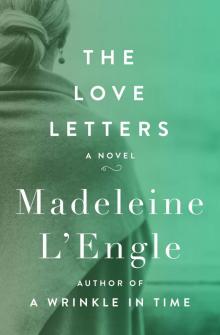 Love Letters
Love Letters The Summer of the Great-Grandmother
The Summer of the Great-Grandmother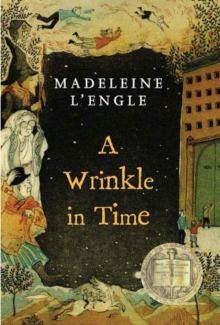 A Wrinkle in Time
A Wrinkle in Time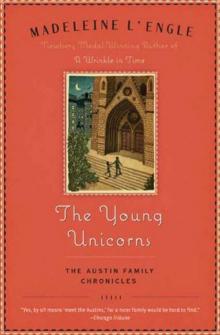 The Young Unicorns
The Young Unicorns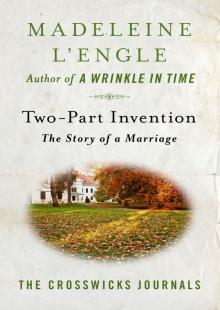 Two-Part Invention: The Story of a Marriage
Two-Part Invention: The Story of a Marriage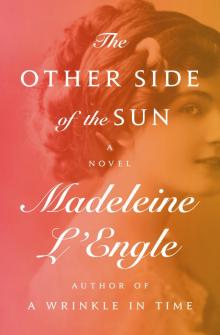 The Other Side of the Sun
The Other Side of the Sun A House Like a Lotus
A House Like a Lotus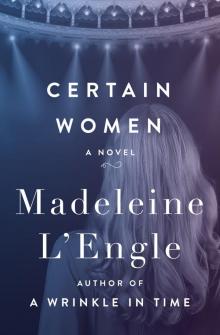 Certain Women
Certain Women Many Waters
Many Waters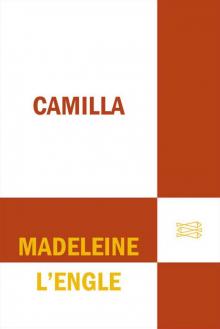 Camilla
Camilla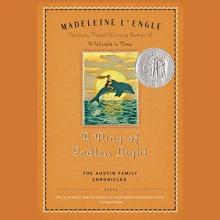 A Ring of Endless Light
A Ring of Endless Light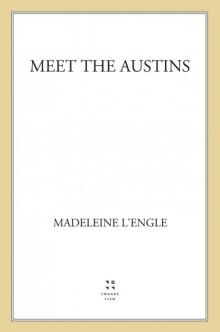 Meet the Austins
Meet the Austins Dragons in the Waters
Dragons in the Waters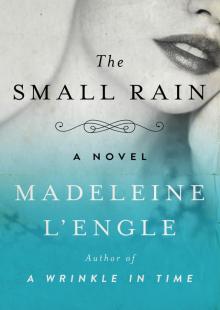 The Small Rain
The Small Rain The Moment of Tenderness
The Moment of Tenderness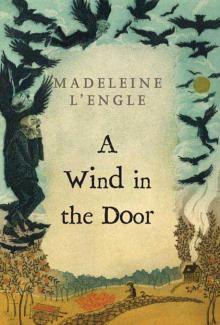 A Wind in the Door
A Wind in the Door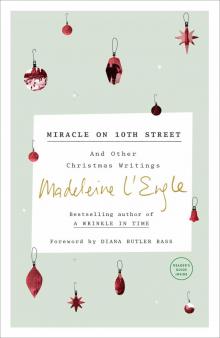 Miracle on 10th Street
Miracle on 10th Street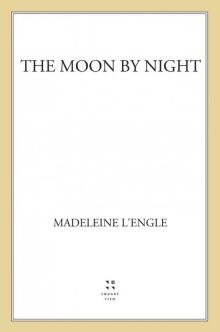 The Moon by Night
The Moon by Night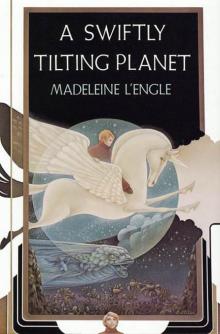 A Swiftly Tilting Planet
A Swiftly Tilting Planet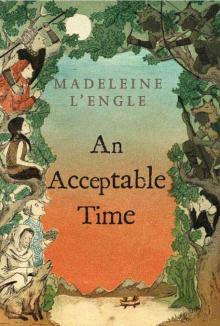 An Acceptable Time
An Acceptable Time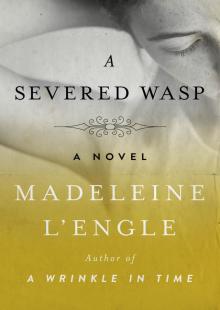 A Severed Wasp
A Severed Wasp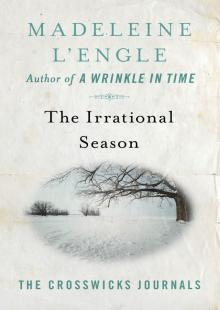 The Irrational Season
The Irrational Season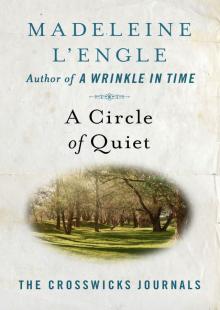 A Circle of Quiet
A Circle of Quiet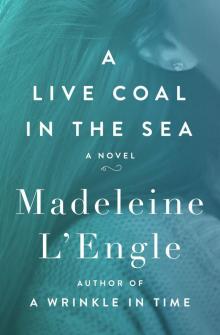 A Live Coal in the Sea
A Live Coal in the Sea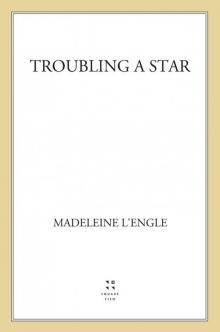 Troubling a Star
Troubling a Star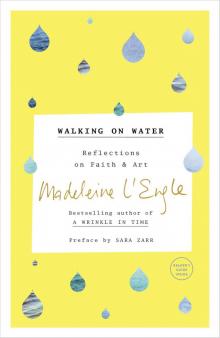 Walking on Water: Reflections on Faith and Art
Walking on Water: Reflections on Faith and Art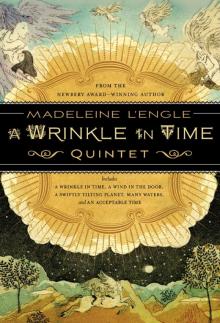 A Wrinkle in Time Quintet
A Wrinkle in Time Quintet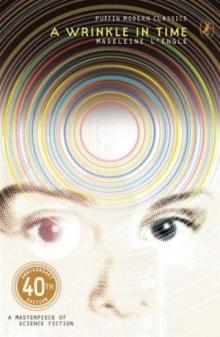 Wrinkle in Time
Wrinkle in Time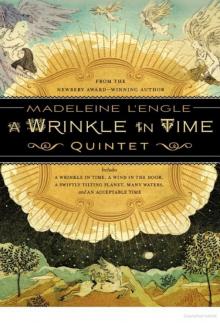 The Wrinkle in Time Quintet
The Wrinkle in Time Quintet Intergalactic P.S. 3
Intergalactic P.S. 3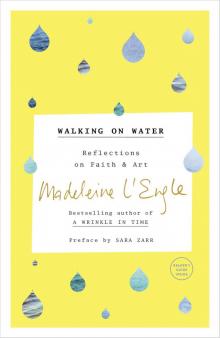 Walking on Water
Walking on Water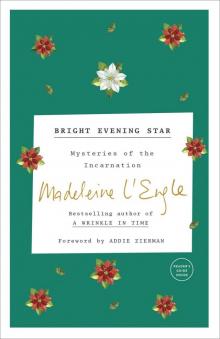 Bright Evening Star
Bright Evening Star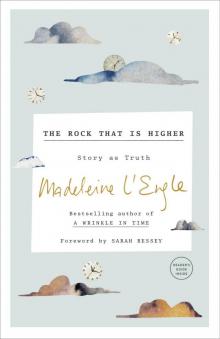 The Rock That Is Higher
The Rock That Is Higher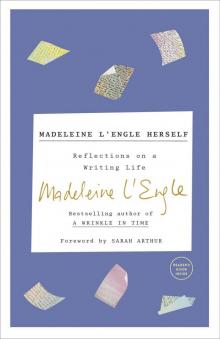 Madeleine L'Engle Herself
Madeleine L'Engle Herself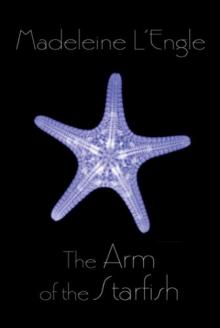 The Arm of the Starfish
The Arm of the Starfish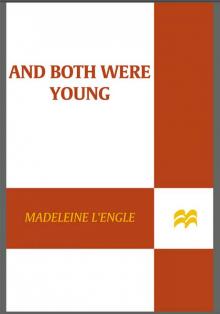 And Both Were Young
And Both Were Young The Twenty-four Days Before Christmas
The Twenty-four Days Before Christmas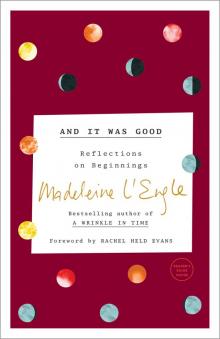 And It Was Good
And It Was Good A Stone for a Pillow
A Stone for a Pillow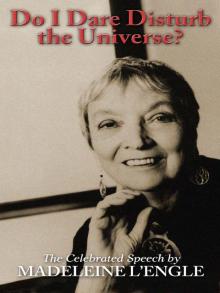 Do I Dare Disturb the Universe?
Do I Dare Disturb the Universe?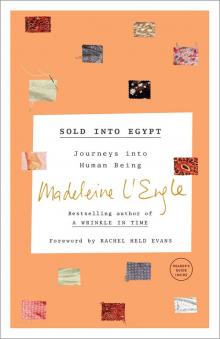 Sold into Egypt
Sold into Egypt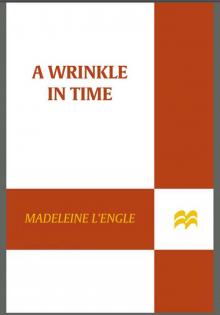 A Wrinkle in Time (Madeleine L'Engle's Time Quintet)
A Wrinkle in Time (Madeleine L'Engle's Time Quintet)